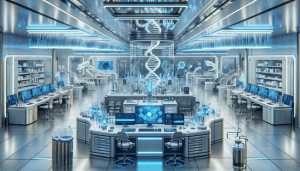Biotechnology has rapidly become foundational for modern healthcare, offering groundbreaking solutions that transcend traditional medical practices. With its roots in the manipulation of biological systems and organisms to develop new products and technologies, biotechnology has introduced a paradigm shift in how diseases are understood, diagnosed and treated. This transformation is largely attributed to advancements in molecular biology, genetics and bioengineering, leading to personalized medicine, regenerative therapies and innovative diagnostic tools.

Personalized Medicine: A Tailored Approach to Treatment
A significant contribution of biotechnology to healthcare is the development of personalized medicine that tailors treatment to the individual characteristics of each patient, considering their genetic profile, lifestyle and environment. Advances in genomics have enabled the identification of genetic mutations and biomarkers linked to various diseases, allowing for more accurate diagnoses and targeted therapies. Meanwhile, specialized lab spaces for biotech research have accelerated these advancements, allowing scientists to explore new avenues in personalized treatment. Cancer treatment, for example, has been revolutionized by identifying specific genetic mutations driving tumor growth, leading to therapies that minimize side effects and improve outcomes. This shift away from the “one-size-fits-all” approach offers a more precise and effective means of managing diseases.
Regenerative Medicine: Repairing and Replacing Damaged Tissues
Regenerative medicine—another frontier of biotechnology—focuses on repairing, replacing or regenerating damaged tissues and organs. This field leverages stem cells, tissue engineering and gene therapy to restore function to damaged tissues, offering new hope for patients with conditions previously considered untreatable. Stem cell therapy, in particular, has shown promise in treating a range of conditions, from spinal cord injuries to degenerative diseases such as Parkinson’s and Alzheimer’s. Tissue engineering has also made significant strides, with researchers developing lab-grown organs and tissues that could be used for transplantation. These advancements in regenerative medicine hold the potential to revolutionize organ transplantation and reduce the dependency on donor organs, addressing the chronic shortage of available transplants.
Innovative Diagnostic Tools: Early Detection and Precision Monitoring
The development of innovative diagnostic tools is another area where biotechnology is potentially impactful. Early detection and precision monitoring of diseases are critical for successful treatment outcomes, with biotechnology introducing new tools to enhance diagnostic accuracy. Techniques such as CRISPR-based diagnostics, liquid biopsies and advanced imaging technologies have enabled earlier and more precise detection of diseases, even at the molecular level. Liquid biopsies, for example, enable the detection of cancerous cells and DNA in the bloodstream, facilitating earlier intervention and continuous monitoring of treatment efficacy. These innovations are radically changing diagnostics, leading to more informed clinical decisions and better patient outcomes.
Biopharmaceuticals: Revolutionizing Drug Development
Biopharmaceuticals—or “biologics”—represent another area where biotechnology is transforming healthcare. These drugs, produced using living cells, offer new treatments for conditions previously challenging to manage with traditional pharmaceuticals. Biopharmaceuticals have shown great promise in treating autoimmune diseases, cancers and rare genetic disorders. The production of biologics is a complex process involving recombinant DNA technology, monoclonal antibodies and gene therapy. Pharmaceutical consultants are vital in the commercialization of biopharmaceuticals, providing insights into market trends and helping companies strategize their product launches effectively. Despite the challenges associated with their development and manufacturing, biopharmaceuticals have become one of the fastest-growing sectors in the pharmaceutical industry, offering hope to patients with previously untreatable conditions.
Future Directions and Ethical Considerations
As biotechnology continues to advance, its applications in healthcare are expected to expand even further. Emerging technologies such as CRISPR gene editing, synthetic biology and artificial intelligence are anticipated to drive the next wave of innovations in the field. However, these advancements also raise important ethical considerations, particularly concerning gene editing and data privacy. Ergo, balancing the potential benefits of biotechnology with ethical concerns will be crucial in affirming its applications in healthcare are both effective and socially responsible.
